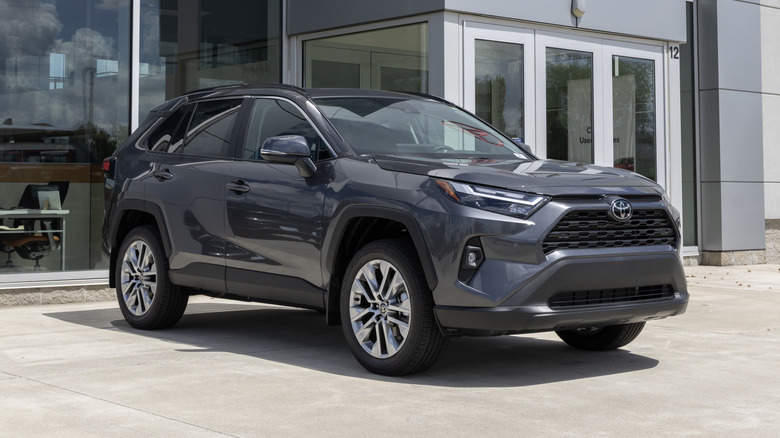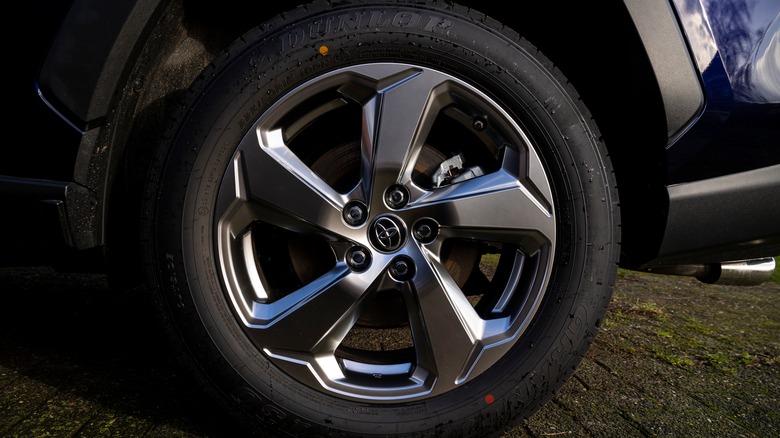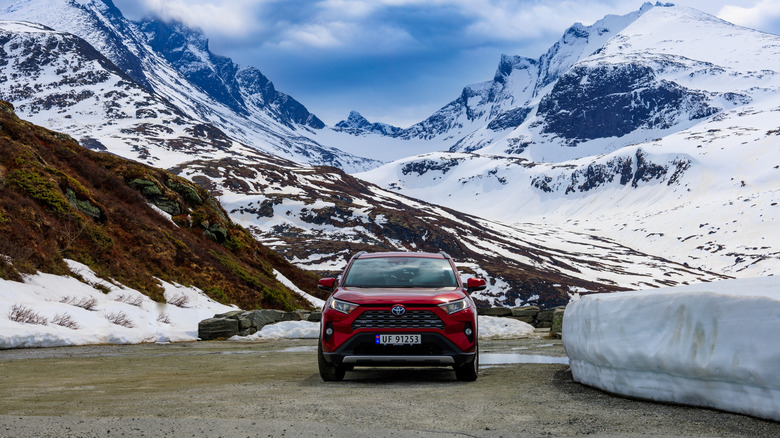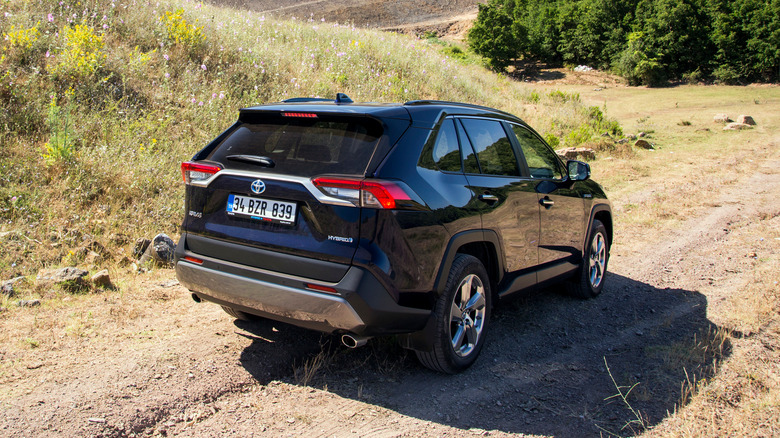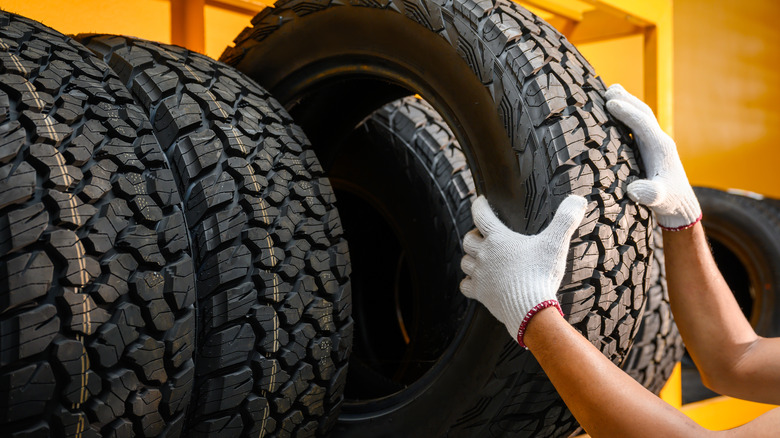How To Choose The Best Tires For Your Toyota RAV4
The Toyota RAV4 is an extremely versatile vehicle. It combines performance, economy, storage, and utility into a single compact design. This, combined with Toyota's reputation for reliability, is why it deserves all of its American sales success and has been the best-selling SUV in the world for the last four years in a row. Still, that doesn't mean it doesn't need the same tire upkeep as any other car. Whether you've found yourself on the side of the road with a flat or you've simply noticed that the tread is starting to get a little bare, all tires eventually need to be replaced, and it's important to make sure you get the best ones for your individual needs. Choosing the right tires for your RAV4 might seem straightforward, but it's actually a pretty big decision.
There are a lot of different kinds of tires that fit Toyota's popular SUV, and many of them are specialized for use in specific scenarios. No tire is perfect for all terrains, and your vehicle's performance can improve with the right treads. Different drivers will benefit from different feature sets depending on factors such as the weather in your area, the terrain you usually drive on, and your individual budget. You should consider each of these before deciding which tires are the best for your vehicle.
Determine the size
Strange though it might sound, not all RAV4s use the same size tires. There are five generations of RAV4, but even models from the same year might require slightly different sizes. Sometimes, the tire has a wider circumference, sometimes the tread width is narrower, and other times, they can be exactly the same dimensions but have different size rims. That's why a 2023 RAV4 Adventure, LE, Limited, Prime SE, and TRD Off-Road all have different size designations, and it's why it's always important to figure out what size you need before you order anything that might not fit.
The good news is figuring out your tire size is easy. The designation should be listed in your owner's manual, but you can easily look it up using a website like TireSize.com or simply look on the side of one of the tires currently on your vehicle. The size should be listed as a number that looks something like this: 235/55R19. These numbers represent the tire's width, aspect ratio, and rim size respectively. Once you have this number, you should be able to bring it to any tire dealer or punch it into an online ordering form to get the right size for your specific RAV4.
Consider the weather
There are drivers who will be loading snowboards into the back of an RAV4 in the mountains of Colorado and those who will be loading surfboards into the back of an RAV4 on the beaches of L.A. Both of these drivers might have the same SUV, but they probably need different tires. What's more, the names of these tire types can be a little misleading.
All-season tires are some of the most commonly used, but the name is somewhat deceptive. All-season tires are only good for light snow and are best suited to wet and moderate weather conditions. On the other hand, the similarly named all-weather tires are perfectly capable of handling moderate snowfalls at above-freezing temperatures.
Of course, those who live in regions with heavy snowfall and sub-freezing temperatures will need dedicated winter tires, AKA snow tires. These have deeper and more aggressive tread that is made to traverse snow, ice, rain, and slush safely. They're also made with a special rubber compound that is designed to remain flexible even in temperatures that plummet below 45 degrees.
On or off-road?
Even if snow isn't an issue, though, the type of tire you should buy for your RAV4 also depends on the kind of terrain that you will be driving on. There are special kinds of tires that are designed specifically for trucks and SUVs that are made to cater to different environments. Someone who uses their RAV4 to commute to work, run errands in town, and pick up their kids from school in the city probably doesn't need the same tires as someone who needs to tow farm supplies across muddy fields or cart tools to an unpaved construction site.
Those who primarily drive on paved roads should opt for basic passenger tires, touring tires, or sport truck tires. These are designed to have smooth and reliable traction, make less noise, and typically boast a longer tread life so long as you stick to the pavement. Performance tires are also a good option for areas that get a lot of rain, like the Pacific Northwest, since they have larger circumferential and lateral grooves, which gives them better traction in wet weather.
Those who take their RAV4 off the beaten path might be better off getting all-terrain or mud-terrain tires. All-terrain is best for hybrid on and off-road driving. Meanwhile, mud-terrain is for drivers who need the most aggressive tread pattern possible for off-roading. These also typically have siding protection to reduce the likelihood of punctures, abrasions, and tearing.
Choose the best brand in your budget
Size, weather, and tread are important considerations, but so is price. Just because you need new tires doesn't necessarily mean you want to splurge for the most expensive option out there. That said, you probably don't want to buy the cheapest thing that fits either. Different tires are rated to cover a certain number of miles before they need to be replaced. That means you might save money in the long run by spending more upfront on tires that last longer.
Just because a tire is rated for a certain number of miles doesn't mean the tread will last that long, especially if you're spending a lot of time driving over rough terrain. That's why you should consider choosing one that has a good warranty. There's nothing worse than finding a nail in one of your new tires a few days after you roll it out of the shop.
Once you know what size and type of tire you need, you can look into the brands available and choose the best option that suits your needs and budget. Discount Tire will give recommended results based on the year and model of your RAV4, or you can simply contact your local tire dealer to ask about their available inventory before making a purchase.
